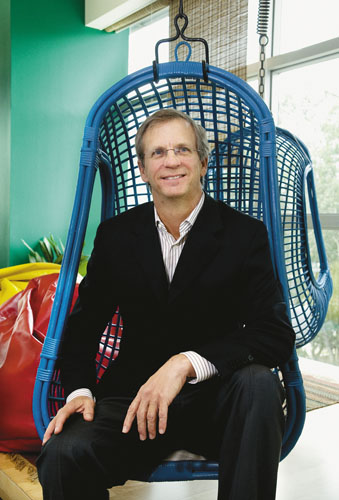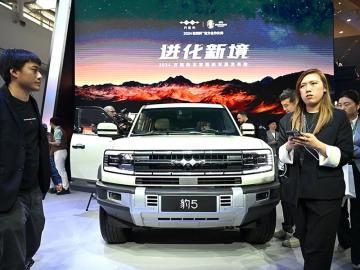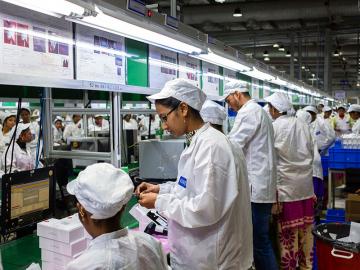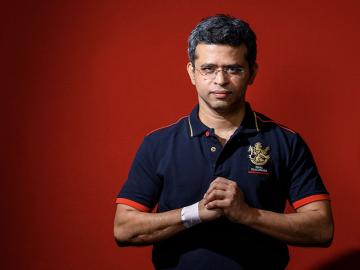
"We still have the Mentality of a Small Company"
Google is not interested in solving the small problems of the world. Its vast engineering talent (roughly half of the company) is eager to work on large problems that have a big impact on its users, says Alan Eustace
Google has been getting into a lot of new businesses like the Android mobile OS or data centres that seem unrelated to its core business of search. How do all these come together for Google?
Communication is a very important source of information. That brings in mail, chat or video chat.
Android is interesting because four years ago if I wanted to get an application in front of the mobile ecosystem, I would have to write it for every single different phone across literally hundreds of phones, each of which has a 1-2 percent market share. It was an enormous effort to get any kind of application in front of a large number of users. Contrast that with the Web where anybody can put up a page and its accessible anywhere.
If you are in so many different areas, how can we define the company today?
It would be easier for me if we were a three-bullet point company — we’re doing x, y and z. Google is more complicated than that as a company. We’re attempting to do more, because there’s more to do in our area.
For example, we’re trying to basically support Internet delivered applications. Gmail was one of the first examples of a large-scale Internet delivered application that you didn’t buy in a store.
We weren’t in the business of building a browser until we realised that the browser is an important strategic thing for us because potentially competitors could block us from our customers.
The question is do you need the operating system as you’ve known it before? The answer may be no. We might be able to deliver a relatively fast, small and secure operating system that’s easier to learn because most people right now spend the majority of their time on a browser.
You derive most of your revenue primarily from search. How then do you allocate resources across so many things in parallel?
Most of our revenue comes from advertising. It is both through our Ad Words and Ad Sense — one for publishers and one for search related. Those are two independent products. If the search thing went away, we would still be supporting a lot of publishers through our advertising network and vice versa.
The key to doing more things is to do them with less people. Take Chrome. That’s an amazing amount of work and it didn’t require 500, 1,000 or 2,000 people.
Many people think that Google is defying all the rules of core competence.
There are two ways to look at this. The first is what the Internet does to your company for growth and scaling. Google became a global company pretty much instantly, because the crawling of the Web knew no borders. Contrast that to a Ford or GM. Their model of expansion internationally might be to pick one country, test the water for two years, build that up and then add a second country. The Internet changes the distribution model by providing immediate access everywhere.
The second question is how successful can you be as a horizontal versus a vertical? It’s true that we could’ve outsourced our data centres, and in the very beginning we did just that.
But we realised that we could make a lot of optimisations if we had a vertical stack. In other words, if we worked on all the pieces. Nobody else was building clusters of machines at that scale, and so the price points that were being offered were very high. Networking was very expensive so we built our own networking. We found that by putting our data centres in places where the power was cheaper and greener, and by distributing our own electricity, we could save a lot of money.
We build all our systems out of relatively standard PC technology that’s dirt cheap. But those things are going to fail relatively frequently. We built a layer of software to hide failures.
For us it’s about being able to do tradeoffs between where we optimise and where we spend engineering time.
Ford and GM know that people need cars, so they can go on building those. Here you don’t know what we are going to need. How do you decide what project is a priority?
I would love to say that we have a well-defined 10-year strategic plan but it wouldn’t be true. Larry [Page] and Sergei [Brin; the founders of Google] are adamant that we try big things not small ones. We are not an incremental company. You mentioned trying to solve problems that we don’t even know you have. When Gmail was being developed, it was being developed for us. We felt that the mail systems we were using were very inefficient, and that we could do better. If we had asked our customers, “does the world need a new email system?” everybody would’ve said no. So you shouldn’t depend on your customers to tell you what the next big thing is. They won’t tell you what to build. They’ll tell you, ‘you have a bug in your system.’
We’re our own users. We work on the same problems we have.
We tend to be motivated by comments like that. Our future is in our hands, not in the hands of our competitors. Competition is a fabulous thing. It causes everybody to work harder, causes people to try things that they would never try. Microsoft is a well known company that needs a big competitor, Google motivates them in ways. What motivates us is not a particular competitor, but to build the next generation of products and solve the next generation of problems. We are blessed with enormous computational and networking resources, we hire some of the smartest people in the world and we give them literally thousands of machines, lots of data to work on and a worldwide reach across all countries and languages. I think that’s motivation enough, we don’t need the external motivation.
Does your size become an enemy in attracting the best engineering talent?
From an engineering point of view, we hire really smart people and they have lots of opportunities.
We have a really flat hierarchy, which means a lot of people get responsibilities very early on. So if you look at the levels between me and an engineer in the company, it’s relatively small, maybe four or five. In a lot of companies you have to go up and down the management hierarchy to get things done, but in Google that makes no sense. We’re willing to try a lot of different things, and that culture means we get to keep a lot of our entrepreneurs.
People said flat hierarchies or consensus-style management works till you’re 500 people, at 1,000 people it would never work. Now we’re 20,000 people and we still have the mentality of a small company. People forget that we’re run by exactly the same people — it’s the same 10 people that I’ve been in a room with for the last seven years.
Is there any big trend which you feel Google was blindsided by, or would like to be
stronger on?
We’re well positioned on most of the things that we’re doing. But in hindsight we were a little slow in the mobile space, because the ecosystem was very difficult to penetrate. You had handset manufacturers and carriers and walled gardens…we had a bunch of people working at it for a long time but without much progress. But then iPhone and Android decided to move up the value chain a little bit. We put more of our resources on smart phones and that allowed us to focus a lot more. So it wasn’t that we caught up with mobile, but mobile caught up with where we were trying to go.
Since then we’ve been executing really, really well on mobile and taking advantage of the most significant change — cloud-based infrastructure as a supporting medium.
Mobile phones are becoming very powerful devices, and allowing a set of applications to bloom that would never have been possible.
Do you feel that with 300 million people within its closed network, Facebook today is in some ways a monopoly? Or iPhone, because there too we have a walled garden where all developers have to go through Apple?
I believe in mutual dependence. I think both Facebook and Apple are doing a good job. Both are opening up ecosystems that allow [third] parties to build applications, as with Android. I think it’s much better than the walled garden approach.
One of the things that I’m very proud of is our data liberation efforts — you can get information out of our products. So you can get a dump of all your email in a format that another email provider you want to switch to can understand. That’s scary from a market point of view, but it’s trying to break through this wall of who owns your data — you own it.
I think it’s important to have the conviction that such a model will in the end result in better products than us just protecting all our users’ data.
(This story appears in the 18 December, 2009 issue of Forbes India. To visit our Archives, click here.)
Post Your Comment















